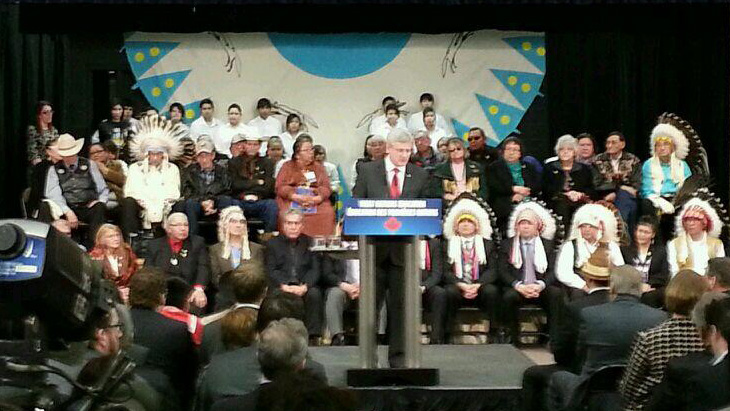
APTN National News
Calling it a “historic” announcement, Prime Minister Stephen Harper on Friday unveiled reworked and renamed proposed legislation for First Nations on-reserve education that comes with $1.9 billion in funding.
Harper made the announcement at the Kainai High School on the Blood Tribe reserve in Alberta along with Assembly of First Nations National Chief Shawn Atleo and Aboriginal Affairs Minister Bernard Valcourt.
Ottawa and First Nations chiefs had been battling over the development of legislation governing education on reserves.
Friday’s announcement came as a result of negotiations between the AFN and senior federal officials in the PMO, PCO and Aboriginal Affairs.
The proposed bill, once called the First Nations Education Act, will be called the First Nation Control of First Nation Education Act.
“The federal government, which has the constitutional responsibility for this, has historically veered from a sometimes disinterested neglect and at other times arbitrary decree,” said Harper. “It is a great day for Canada, for First Nation communities and the next generation…again, it is long overdue.”
Valcourt said the agreement marked a turning point in First Nation-Crown relations.
“This agreement brings us one giant step closer toward our ultimate goal of reconciliation with the First Nations and attests to the new beginning and a new opportunity to move forward together in partnership,” said Valcourt.
The renamed and updated bill was unveiled as part of an agreement struck between the AFN and the federal government. The agreement also includes promises from the federal government to invest $160 million over four years, beginning in 2015, to fund implementation of the new legislation. Ottawa has also agreed to invest $500 million over seven years beginning in 2015 for infrastructure. The federal government will also put $1.252 billion over three years, beginning in 2016, toward core funding for education. The government will also eliminate the two per cent cap and replace it with a 4.5 per cent cap.
The next federal election is scheduled for 2015.
The renamed bill still carries some of the main aims of its previous incarnation including the creation of minimum education standards consistent with provincial standards, establishing roles for First Nation education administrators require annual reporting and allow for the creation of First Nation education authorities.
The bill now establishes stable funding for education, creating a statutory funding stream for transition and long-term infrastructure investment. The bill would also create a “Joint Council of Education Professionals” that will advise Ottawa and First Nations on the implementation of the proposed bill. First Nations will also be able to incorporate language and cultural programming into their education systems under the new statutory funding stream.
“I do join in marking the beginning of a new way forward to mark the beginning of a new way of life,” said Atleo. “We can do this in our time.”
The tail end of the press conference was interrupted by a Treaty 6 woman from Saddle Lake Cree Nation. With one of Harper’s RCMP security escorts eyeing her warily, Shannon Houle raised her fist and said not all First Nations were consulted on the agreement and it did not have their support.
The federal budget will be tabled next Tuesday.









